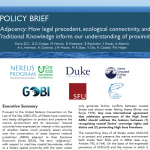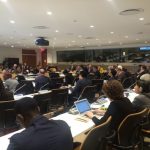The Second Session of the Preparatory Committee related to Marine Biological Diversity Areas Beyond National Jurisdiction took place from August 26 to September 9 at the United Nations Headquarters in New York City, United States.
The 15-day-long session produced recommendations to the General Assembly on the elements to be included in an internationally binding instrument for the conservation and sustainable use of biological diversity beyond areas of national jurisdiction, following the United Nation’s 2015 resolution to create the aforementioned legal instrument.
Nereus Senior Research Fellow at Duke Daniel Dunn and Nereus Principal Investigator at Duke Patrick Halpin attended the session and presented at a series of side events:
Capacity Building and Transfer of Marine Technology – August 29th
Organized by the Mission of Belgium, the Mission of Fiji, and the Intergovernmental Oceanographic Commission of UNESCO, this side event focused on Capacity Building and Transfer of Marine Technology as with which to tools to foster international cooperation in marine science research and technology. Dunn presented a panel titled “The role of research in informing area-based management and environmental impact assessments in ABNJ, particularly through technology transfer and capacity building”
Recent developments in ocean mapping and marine spatial planning technologies: Tools for Policy-makers – August 31st
Organized by the Natural Resources Defense Council and High Seas Alliance, Dunn and Halpin attended as representatives from the Marine Geospatial Ecology Lab at Duke University, and presented on the current state of open-access data, new monitoring methods, and modelling approaches that will help inform management of areas beyond national jurisdiction.
A series of policy briefs was also created for this meeting. View the Nereus Scientific & Technical Briefs on Marine Areas Beyond National Jurisdiction (ABNJ) series.








